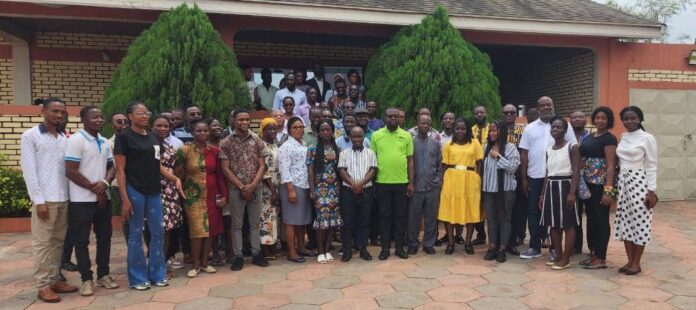Author: Prince Ato Koomson
The Green Africa Youth Organization (GAYO) has held a one-day media conference to enhance the knowledge and awareness of journalists, young activists, and individuals to bridge the incineration and plastic pollution news gap in the media landscape.
GAYO is currently involved in a campaign dubbed “Anti-Incineration and Plastic Pollution Campaign (AIPPC)” aimed at sensitizing communities to the negative impacts of all forms of incineration and plastic pollution on the environment and public health.
As part of its initiatives within the circular economy and climate change sectors, GAYO launched the campaign in collaboration with the GAYO Eco-Club Campus Chapters (GECCC) with funding support from the Global Alliance for Incinerator Alternatives (GAIA). The GAYO Eco-Club Campus Chapters (GECCCs) are teams of students and volunteers set up on university campuses through which community actions and awareness creation activities are undertaken in line with the campaign objectives.
At the event, extensive panel discussions were held to broaden the knowledge of media personnel on the effects of plastic pollution on the environment and public health and the way forward.
Addressing the media, the President of Informal Waste Workers Ghana, Madam Lydia Bamfo urged policymakers and politicians to be welcoming of initiatives that seek to help the country as a whole.
She implored the academia not to look down on the informal sector who provide key services to the country; adding that they’ll need their acquired knowledge to advance their course and make the country a better place; particularly in the area of waste management.
Background
Plastic pollution constitutes a planetary crisis with impacts on ecosystems, biodiversity, the climate, and human health. Without new and effective control measures, plastic production is set to double in 20 years and plastic waste leaking into the ocean is projected to triple by 2040.
It is an unacceptable burden to place on future generations concerning plastic production, disposal, and the rate at which companies, organizations, and individuals involve themselves in “waste-to-energy” and open burning.
Incineration is often considered a false solution to plastic pollution in waste management because while it may reduce the amount of plastic waste being burned, it does not address the root cause of the problem, which is the excessive production and disposal of single-use plastic products.
Effective waste management solutions to plastic pollution should focus on reducing the production of single-use plastics, promoting the use of reusable products, improving recycling and composting systems, and engaging communities in responsible waste management practices.
Broad Objective
Overall, it is anticipated that the anti-incineration and plastic pollution campaign in Ghana will court indigenous support for climate action by raising awareness, advocating for alternative solutions, and mobilizing communities, this campaign hopes to make a positive impact on the environment and public health.









































